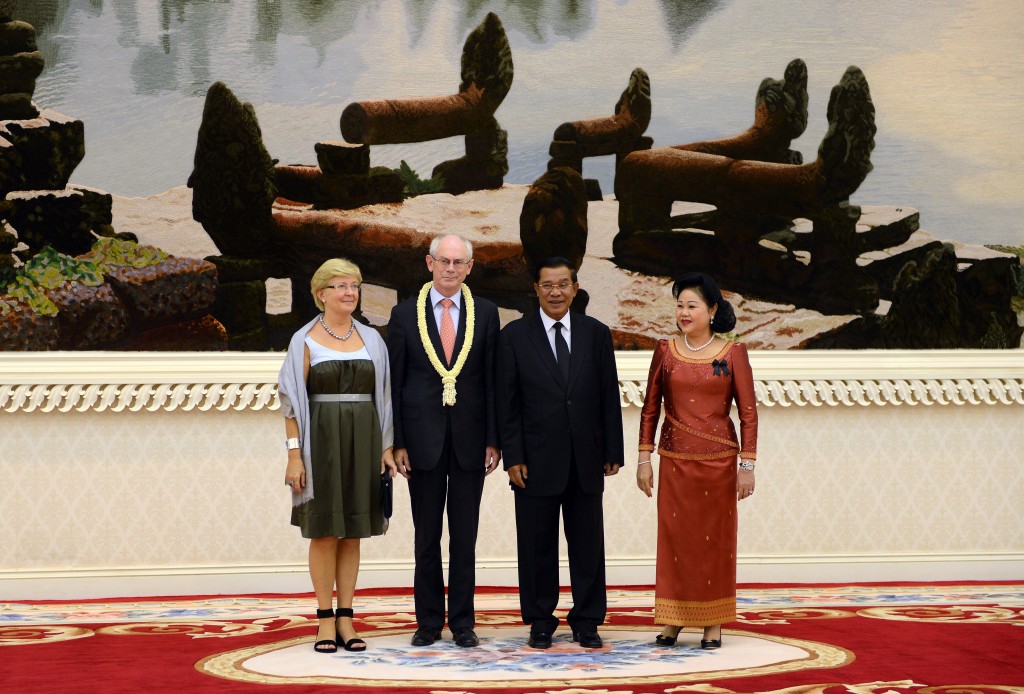
ប្រធានក្រុមប្រឹក្សាអឺរ៉ុប លោក ហឺមេន វេន រ៉ុមពុយ (នៅកណ្តាលពីឆ្វេង) និងលោកជំទាវ ជីទ្រុយ វេន រ៉ុមពុយ (ឆ្វេង) នាយករដ្ឋមន្រ្តីនៃប្រទេសកម្ពុជា ហ៊ុន សែន (នៅកណ្តាលពីស្តាំ) និងលោកជំទាវ ប៊ុន រ៉ានី ហ៊ុន សែន (ស្តាំ) នៅវិមានសន្តិភាព ប្រទេសកម្ពុជា។ រូបភាព ថតដោយ ប្រធានក្រុមប្រឹក្សាអឺរ៉ុប កាលនៅថ្ងៃទី២ ខែវិច្ឆិកា ឆ្នាំ២០១២។ ក្រោមអាជ្ញាប័ណ្ណ CC BY-NC-ND 2.0
រាជរដ្ឋាភិបាលនៃប្រទេសកម្ពុជា តំណាងឲ្យអង្គនីតិប្រតិបត្តិ នៃរដ្ឋាភិបាល។ ស្ថាប័ននេះ ទទួលខុសត្រូវអនុវត្តច្បាប់ និងដឹកនាំកិច្ចការ ទូទៅរបស់រដ្ឋ ស្របតាមកម្មវិធីនយោបាយ អនុម័តយល់ព្រមដោយ សភា (រដ្ឋសភា និងព្រឹទ្ធសភា)។1 ការបែងចែកអំណាចដាច់ដោយឡែកពីគ្នា ជាអំណាចនីតិប្រតិបត្តិ អំណាចនីតិប្បញ្ញត្តិ និង អំណាចតុលាការ ត្រូវបានប្បញ្ញត្តិ ក្នុងមាត្រា ៥១ ថ្មី នៃរដ្ឋធម្មនុញ្ញ។
គណៈរដ្ឋមន្រ្តី គឺជាស្ថាប័នគោល នៅក្នុងរាជរដ្ឋាភិបាលនៃព្រះរាជា ណាចក្រកម្ពុជា។ នាយករដ្ឋមន្រ្តី ត្រូវតែជាតំណាងរាស្រ្តក្នុងរដ្ឋសភា ខណៈដែលសមាជិកដទៃទៀតរបស់គណៈរដ្ឋមន្រ្តី អាចនឹងត្រូវបានជ្រើសរើសមកពីចំណោមសមាជិកនៃគណបក្សនយោបាយ ដែលមិន មែនជាសមាជិករដ្ឋសភា។2 សមាជិក នៃគណៈរដ្ឋមន្ត្រី គឺបណ្តាមន្ត្រីជាន់ខ្ពស់របស់រាជរដ្ឋាភិបាល ដែលមានឋានៈស្មើនឹងរដ្ឋលេខាធិការ ឬខ្ពស់ជាងនេះ ដូចជា រដ្ឋមន្ត្រី ទេសរដ្ឋមន្ត្រី ឧបនាយករដ្ឋមន្ត្រី និងនាយករដ្ឋមន្ត្រី ជាដើម។3
សមាជិកនៃគណៈរដ្ឋមន្ត្រី និងនាយករដ្ឋមន្ត្រី ទទួលខុសត្រូវរួមគ្នានៅចំពោះមុខរដ្ឋសភា អំពីគោលនយោបាយទូទៅ និងការបំពេញកិច្ចការរដ្ឋ របស់រាជរដ្ឋាភិបាល។4 តាមរយៈលិខិតជាលាយលក្ខណ៍អក្សរ ប្រធាន សមាជិក ឬគណៈកម្មការពិសេស នៃរដ្ឋសភា អាចចោទជាសំណួរទៅកាន់សមាជិក នៃគណៈរដ្ឋមន្ត្រី ឬនាយករដ្ឋមន្ត្រី។ ចម្លើយឆ្លើយតប អាចត្រូវបានធ្វើឡើងដោយផ្ទាល់មាត់ ឬលាយលក្ខណ៍អក្សរ ហើយត្រូវធ្វើឡើងក្នុងរយៈពេល ៧ថ្ងៃ បន្ទាប់ពីបានទទួលលិខិតចោទសួរនោះ។5 ញត្តិស្តីបន្ទោស អាចត្រូវបានផ្តួចផ្តើមឡើង ដោយតំណាងរាស្ត្រ ៣០រូប យ៉ាងតិច និង ត្រូវអនុម័តដោយសំឡេងឆ្នោតភាគច្រើនដាច់ខាត នៃសមាជិករដ្ឋសភាទាំងមូល ដែលអាចនាំឲ្យមានការទំលាក់សមាជិកគណៈរដ្ឋមន្ត្រី ឬគណៈរដ្ឋមន្ត្រីទាំងពូលពីតំណែង ។6
នាយករដ្ឋមន្ត្រី ដឹកនាំគ្រប់កិច្ចការទាំងអស់របស់គណៈរដ្ឋមន្ត្រី និងបញ្ជាចាត់ចែងរាល់សកម្មភាពរបស់គណៈរដ្ឋមន្ត្រី លើគ្រប់វិស័យ។7 លើកលែងតែប្រធានស្ថាប័នរដ្ឋ ជាធម្មតា សមាជិកនៃគណៈរដ្ឋមន្ត្រី ត្រូវបានប្រគល់ភារកិច្ច និងការទទួលខុសត្រូវ ដោយសេចក្តីសម្រេចរបស់នាយករដ្ឋមន្ត្រី។8 ប្រធានស្ថាប័ន សំដៅទៅសមាជិកនៃគណៈរដ្ឋមន្ត្រីណា ដែលដឹកនាំ និងគ្រប់គ្រង ក្រសួង ឬរដ្ឋលេខាធិការដ្ឋាន។9
រាល់កិច្ចការទាំងអស់របស់អង្គនីតិប្រតិបត្តិនេះ ត្រូវសម្រេចដោយកិច្ចប្រជុំពេញអង្គ ឬប្រជុំធំ នៃគណៈរដ្ឋមន្ត្រី។10 កិច្ចប្រជុំផ្សេងទៀតរបស់គណៈរដ្ឋមន្ត្រី ដូចជាកិច្ចប្រជុំអន្តរក្រសួង និងកិច្ចប្រជុំការងារ មិនតម្រូវចាំបាច់ឲ្យធ្វើនៅក្រោមអធិបតីភាពនៃនាយករដ្ឋមន្ត្រីទេ និងអាចដឹកនាំដោយឧបនាយករដ្ឋមន្ត្រី តាមការផ្ទេរសិទ្ធិ ប៉ុន្តែមិនអាចសម្រេច កិច្ចការក្នុងនាមគណៈរដ្ឋមន្ត្រីបានទេ។11 កោះប្រជុំដោយនាយករដ្ឋមន្ត្រី គណៈរដ្ឋមន្ត្រីជួបប្រជុំគ្នារៀលរាល់សប្តាហ៍ ហើយកំណត់ហេតុនៃកិច្ចប្រជុំ ត្រូវបញ្ជូនទៅព្រះមហាក្សត្រ ដែលជាប្រមុខរដ្ឋ។12 ក្រោយការដឹកនាំរបស់រដ្ឋមន្ត្រី និងរដ្ឋលេខាធិការ ទីស្តីការគណៈរដ្ឋមន្ត្រី ទទួលខុសត្រូវជួយដល់កិច្ចប្រជុំ និងកិច្ចការផ្សេងទៀត នៃគណៈរដ្ឋមន្រី្ត។
សព្វថ្ងៃនេះ រាជរដ្ឋាភិបាលនៃប្រទេសកម្ពុជាកំពុងបំពេញភារកិច្ច សម្រាប់អាណត្តិទី៥ ចាប់ពីឆ្នាំ២០១៣ ដល់ឆ្នាំ២០១៨។ បើទោះបីលទ្ធផលនៃការបោះឆ្នោតជាតិឆ្នាំ២០១៣ មានសភាពចម្រូងចម្រាស និងការធ្វើពហិការដោយសមាជិករបស់គណបក្សប្រឆាំង ពីការចូលរួមនៅក្នុងសម័យប្រជុំដំបូងនៃរដ្ឋសភានីតិកាលទី៥ ក៏រាជរដ្ឋាភិបាលថ្មីបានចូលស្បថ និងទទួលបានការតែងតែងពីព្រះមហាក្សត្រ សម្រាប់អាណត្តិថ្មី កាលពីខែកញ្ញា ឆ្នាំ២០១៣។13 រដ្ឋាភិបាលថ្មីនេះ បានដាក់ចេញនូវ គោលនយោបាយជាតិ ដែលនឹងត្រូវប្រើសម្រាប់តម្រង់ទិសការគ្រប់គ្រងរដ្ឋបាល វិស័យអាទិភាព និងមធ្យោបាយអនុវត្តគោលនយោបាយផ្សេងៗ នៅចំពោះមុខរដ្ឋសភា ដែលជាអង្គភាពតំណាងឲ្យប្រជាពលរដ្ឋម្ចាស់ឆ្នោត។14 នៅដើមនីតិកាលទី៥នេះ កំណែទម្រង់ស្ថាប័ន និងច្បាប់មួយចំនួន ត្រូវបានធ្វើឡើងសម្រាប់រដ្ឋាភិបាលជាតិ និងរដ្ឋាភិបាលមូលដ្ឋាន។
គណៈកម្មការពិសេសនៃរដ្ឋសភាត្រូវបានបង្កើនចំនួន ពី៩គណៈកម្មការ ទៅ១០គណៈកម្មការ ក្នុងនោះ គណបក្សនយោបាយឈ្នះឆ្នោតនីមួយៗ គណបក្សប្រជាជនកម្ពុជា និងគណបក្សសង្គ្រោះជាតិ ដឹកនាំ៥គណៈកម្មការពិសេស។15 ជាមួយគ្នានេះ ប្រធានក្រុមតំណាងរាស្ត្រនៃគណបក្សនយោបាយផ្សេងពីគណបក្សកាន់អំណាច ដែលមានអាសនៈស្មើនឹង ២៥ ភាគរយ យ៉ាងតិច នៃអាសនៈសរុប ១២៣ នៅក្នុងរដ្ឋសភា អាចឈរឈ្មោះជាប្រធានក្រុមសំឡេងភាគតិច ដែលមានឋានៈស្មើនឹងនាយករដ្ឋមន្ត្រីនិងជាដៃគូរសន្ទនាជាមួយគណបក្សកាន់អំណាច។16 រដ្ឋធម្មនុញ្ញ ត្រូវបានធ្វើវិសោធនកម្ម ដើម្បីបន្ថែមជំពូកថ្មីមួយស្តីពីស្ថាប័នបោះឆ្នោត17 ដោយបើកផ្លូវសម្រាប់ច្បាប់ស្តីពីការរៀបចំ និងការប្រព្រឹត្តទៅនៃគណៈកម្មាធិការជាតិរៀបចំការបោះឆ្នោត។18 ច្បាប់ថ្មីស្តីពីការបោះឆ្នោតជ្រើសតាំងតំណាងរាស្ត្រ ក៏ត្រូវបានប្រកាសឲ្យប្រើជំនួសច្បាប់ចាស់ឆ្នាំ១៩៩៧ ផងដែរ។19
នៅថ្នាក់ក្រោមជាតិ រដ្ឋបាលរបស់រាជធានី ខេត្ត ក្រុង ស្រុក ខណ្ឌ និងឃុំ/សង្កាត់ នឹងទទួលបានស្វ័យតភាពកាន់តែច្រើនពីក្រសួងស្ថាប័នជាតិ។ ទាំងនេះ មានន័យថា វិមជ្ឈការ និងវិសហមជ្ឈការ នៅក្រោមក្របខណ្ឌនៃច្បាប់ស្តីពីការគ្រប់គ្រងរដ្ឋបាលរាជធានី ខេត្ត ក្រុង ស្រុក ខណ្ឌ នឹងទទួលបានការពង្រីកវិសាលភាព។ ក៏ប៉ុន្តែ មាត្រា ២៨ថ្មី នៃ ច្បាប់ស្តីពីការរៀបចំនិងការប្រព្រឹត្តិទៅ នៃគណៈរដ្ឋមន្ត្រី នៅតែជាបទប្បញ្ញត្តិភ្យួរ ពីព្រោះមាត្រានេះ ត្រូវការអនុក្រឹត្យរបស់រាជរដ្ឋាភិបាល ស្តីពីការធ្វើប្រតិភូកម្មអំណាចទៅឲ្យរដ្ឋបាលដែនដី។20
ទាក់ទងនឹងអង្គនីតិប្រតិបត្តិ
បច្ចុប្បន្នភាពចុងក្រោយ ថ្ងៃទី ២៩ ខែកញ្ញា ឆ្នាំ២០១៥
ឯកសារយោង
- 1. ច្បាប់ស្តីពីការរៀបចំនិងកាប្រព្រឹត្តទៅនៃគណៈរដ្ឋមន្រ្តី (ឆ្នាំ១៩៩៤ វិសោធនកម្មឆ្នាំ២០១៣), មាត្រា១ និងមាត្រា៣។ ទាញយកបានពី រដ្ឋសភា. “បញ្ជីច្បាប់៖ ច្បាប់នៅនីតិកាលទី១.”។ ចូលអាននៅថ្ងៃទី ២៥ ខែសីហា ឆ្នាំ២០១៥, http://www.national-assembly.org.kh/ViewLawFile.aspx?LawDID=198
- 2. ដូចខាងដើម កំណត់ចំណាំទី១ មាត្រា១ និងមាត្រា៥។
- 3. ដូចខាងដើម មាត្រា៤។
- 4. ដូចខាងដើម មាត្រា៨។
- 5. រដ្ឋធម្មនុញ្ញ មាត្រា ៩៦ និងមាត្រា៩៧។
- 6. ដូចខាងដើម មាត្រា៩៨។
- 7. ដូចខាងដើម មាត្រា៩។
- 8. ដូចខាងដើម មាត្រា១៩ និង មាត្រា២០។
- 9. ដូចខាងដើម មាត្រា២១ និង មាត្រា២២។
- 10. ដូចខាងដើម មាត្រា១០។
- 11. ដូចខាងដើម មាត្រា១១។
- 12. រដ្ឋធម្មនុញ្ញ មាត្រា ១២៣ថ្មី។
- 13. ព្រះរាជក្រឹត្យលេខ នស/រកម/០៩១៣/៩០៣ ចុះថ្ងៃទី ២៤ ខែកញ្ញា ឆ្នាំ២០១៣។ អាចទាញយកបានពី គណៈកម្មាធិការជាតិសម្រាប់ការអភិវឌ្ឍតាមបែបប្រជាធិបតេយ្យនៅថ្នាក់បក្រោមជាតិ. “ក្របខណ្ឌច្បាប់៖ ព្រះរាជក្រឹត្យស្តីពីការតែងតាំងរាជរដ្ឋាភិបាលនៃព្រះរាជាណាចក្រកម្ពុជា សម្រាប់អាណត្តិទី៥”។ ចូលអាននៅថ្ងៃទី ២ ខែកញ្ញា ឆ្នាំ២០១៥, http://lb.ncdd.gov.kh/Share/Doc%20in%20Library-3/REGULATION/2013-ListGovermentMembers-Ministries.pdf
- 14. សម្រាប់សេចក្តីសង្ខេបស្តីពីសន្ទរកថារបស់នាយករដ្ឋមន្រ្តីនៃប្រទេសកម្ពុជា ហ៊ុន សែន ស្តីពីគោលនយោបាយរបស់រាជរដ្ឋាភិបាល នីតិកាលទី៥នៃរដ្ឋសភា អាចទាញយកពី កម្ពុជាទស្សនថ្មី. “សម័យ ប្រជុំលើកទី១ នៃរដ្ឋសភា.” ខុទ្ធកាល័យសម្តេចអគ្គមហាសេនាបតីតេជោហ៊ុន សែន. ចេញផ្សាយលេខ ១៨៦ ខែកញ្ញា ឆ្នាំ២០១៣។ ចូលអាននៅថ្ងៃទី ២៦ ខែសីហា ឆ្នាំ២០១៥, http://cnv.org.kh/wp-content/uploads/2013/12/cnv_186_sep_13.pdf
- 15. បទបញ្ជាផ្ទៃក្នុងនៃរដ្ឋសភា សម្រាប់នីតិកាលទី៥ ប្រការ៦ថ្មី (ពីរ)។ អាចទាញយកបានពី រដ្ឋសភា. “បញ្ជី ច្បាប់៖ ច្បាប់នៅនីតិកាលទី៥”។ ចូលអាននៅថ្ងៃទី ២៦ ខែសីហា ឆ្នាំ២០១៥, http://www.national-assembly.org.kh/ViewLawFile.aspx?LawDID=461
- 16. ដូចខាងដើម ប្រការ៤៨ថ្មី (បី)។
- 17. ច្បាប់ធម្មនុញ្ញស្តីពីវិសោធនកម្មមាត្រា ៧៦ និងបណ្តាមាត្រានៃជំពូក១៥ថ្មី រហូតដល់ជំពូក១៦ថ្មី នៃរដ្ឋធម្មនុញ្ញ នៃព្រះរាជាណាចក្រកម្ពុជា ប្រកាសឲ្យប្រើដោយព្រះរាជក្រមលេខ នស/រកម/១០១៤/០២២ ចុះថ្ងៃទី ២៣ ខែតុលា ឆ្នាំ២០១៤។ អាចទាញយកបានពី រដ្ឋសភា. “បញ្ជីច្បាប់៖ ច្បាប់នៅនីតិកាលទី៥”។ ចូលអាននៅថ្ងៃទី ២៦ ខែសីហា ឆ្នាំ២០១៥, http://www.national-assembly.org.kh/ViewLawFile.aspx?LawDID=462
- 18. ច្បាប់ស្តីពីការរៀបចំ និងការប្រព្រឹត្តិទៅនៃគណៈកម្មាធិការជាតិរៀបចំការបោះឆ្នោត ត្រូវប្រកាសឲ្យប្រើដោយព្រះរាជក្រមលេខ នស/រកម/០៣១៥/០០២ ចុះថ្ងៃទី ២៦ ខែមីនា ឆ្នាំ២០១៥។ អាចទាញយកបានពី រដ្ឋសភា. “បញ្ជីច្បាប់៖ ច្បាប់នៅនីតិកាលទី៥”។ ចូលអាននៅថ្ងៃទី ២៦ ខែសីហា ឆ្នាំ២០១៥, http://www.national-assembly.org.kh/ViewLawFile.aspx?LawDID=481
- 19. ច្បាប់ស្តីពីការបោះឆ្នោតជ្រើសតាំងតំណាងរាស្រ្ត ត្រូវបានប្រកាសត្រូវប្រកាសឲ្យប្រើដោយព្រះរាជក្រមលេខ នស/រកម/០៣១៥/០០៣ ចុះថ្ងៃទី ២៦ ខែមីនា ឆ្នាំ២០១៥។ អាចទាញយកបានពី រដ្ឋសភា. “បញ្ជីច្បាប់៖ ច្បាប់នៅនីតិកាលទី៥”។ ចូលអាននៅថ្ងៃទី ២៦ ខែសីហា ឆ្នាំ២០១៥, http://www.national-assembly.org.kh/ViewLawFile.aspx?LawDID=482
- 20. ច្បាប់ស្តីពីការរៀបចំ និងកាប្រព្រឹត្តទៅនៃគណៈរដ្ឋមន្រ្តី (វិសោធនកម្មឆ្នាំ២០១៣) ត្រូវបានប្រកាសឲ្យប្រើដោយព្រះរាជក្រមលេខ នស/រកម/០៦១៣/០១២ ចុះថ្ងៃទី ២០ ខែមិថុនា ឆ្នាំ២០១៣។ ទាញយកបានពី រដ្ឋសភា. “បញ្ជីច្បាប់៖ ច្បាប់នៅនីតិកាលទី៤.”។ ចូលអាននៅថ្ងៃទី ២៦ ខែសីហា ឆ្នាំ២០១៥, http://www.national-assembly.org.kh/ViewLawFile.aspx?LawDID=427

